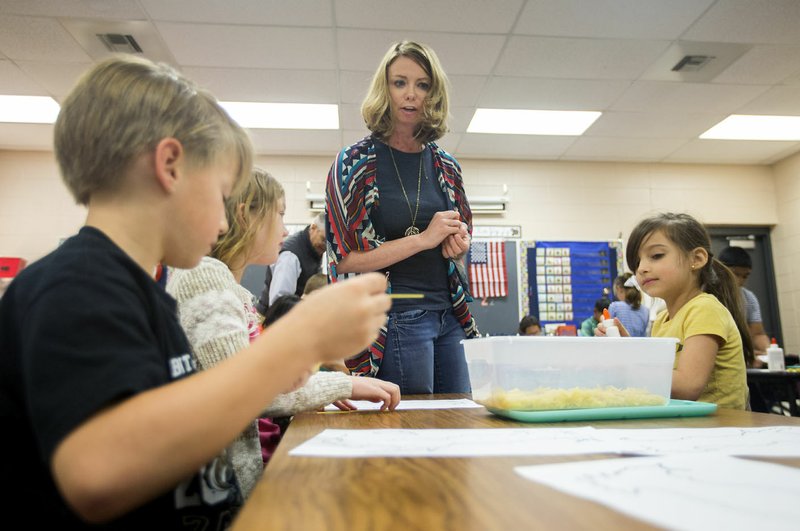BENTONVILLE -- Emilee Helmuth, standing in front of a second-grade class at Apple Glen Elementary School, began her lesson on Italy by telling students about the country's location, population, climate and flag.
Helmuth then zeroed in on the capital city of Rome and one of its famous landmarks, the Colosseum.
Diversity
Here’s an ethnic group breakdown* of Bentonville School District students enrolled as of last fall.
White: 12,277 (74 percent)
Hispanic: 1,815 (11 percent)
Asian: 1,124 (7 percent)
Two or more races: 644 (4 percent)
Black: 495 (3 percent)
Native Hawaiian/Pacific Islander: 49 (0.3 percent)
- Percentages do not add up to 100 percent because of rounding.
Source: Arkansas Department of Education
"Some parts of it are not still standing, because it's over 2,000 years old," Helmuth told the class on Feb. 24. "It was the largest theater ever built, but it wasn't a theater like we go to see a movie. It was more of a stadium where people liked to go for sporting events. The main one was the gladiator fights."
Helmuth teaches Global Connections, one of the activities the Bentonville School District provides to its thousands of elementary students each week along with physical education, art, computers, library and music.
Global Connections is intended "to expose our kids to culture and teach them to look at the world through a more respectful lens," Helmuth said.
The district implemented Global Connections at the start of the 2015-16 school year. It replaced weekly Spanish lessons.
Tamara Gibson, the district's director of instruction for preschool through sixth grade, said based on feedback from principals, students and parents, "We feel that the course is helping our students develop an understanding of the various ethnic populations represented within our community and around the world."
Not everyone has been so impressed. Leah Knight, mother of a former district student, expressed concern about Global Connections to the School Board in January.
Knight said she was not convinced Global Connections should replace a Spanish or language class. She also wasn't comfortable with what she perceived as a lack of structure within the curriculum.
"There's just no clear parameters. It's so wide open to interpretation," Knight said. "So whatever your world view is, you can just slide that right on in there. I feel uncomfortable with that."
That's one of the reasons Knight withdrew her third-grader from Centerton Gamble Elementary School in October, she said.
She also asked at the board meeting why, after administrators initially presented the concept to the board in late 2014, no new or more specific information was brought to the board about it, as a board member had requested.
The board approved the Global Connections class -- originally called "cultural studies" -- by a 5-2 vote in November 2014. Administrators also provided an update on the program to the board in June 2015, right before the program was implemented.
Brent Leas was one of the board members who originally voted against Global Connections. At the time he said he worried class discussions could take a "slippery slope" toward religion and other sensitive subjects.
Leas, who has a daughter in the third grade at Cooper Elementary School, said last week his reservations mostly have been resolved.
"I will keep an eye on it," Leas said. "But my daughter has enjoyed the class and gotten a lot out of it. I'm cautiously optimistic."
The only change he'd like to see is some more emphasis on the United States and the idea of "American exceptionalism," he said.
Arkansas Department of Education data suggest the School District is gradually becoming more diverse.
The percentage of white Bentonville students has fallen from 83 percent during the 2007-08 school year to 74 percent today. The percentage of Asians has increased from 3 percent to nearly 7 percent, and the percentage who are Hispanic has grown from 9 percent to almost 11 percent.
Helmuth taught the Spanish activity class before it was converted to Global Connections. The subject material excites her, she said.
"Every elementary student attending a Bentonville public school now has the opportunity to learn about global issues and obtain a wider world view," Helmuth said. "It is truly an honor to teach Global Connections and watch our kids look at diversity in a positive light instead of a negative one."
Helmuth modifies her lessons to fit the different grade levels she teaches. During her lesson on Italy, Helmuth gave each second-grader a geographic outline of the country on paper and had them glue dry pasta to fill it in.
"The younger kids like crafts a lot," she said.
Other recent lessons have been on Asia.
"We have several students from Apple Glen whose families are from China, so everyone was excited to learn about the fun traditions around Chinese New Year," Helmuth said. "We made lanterns to celebrate the Year of the Rooster. We also learned about the Great Wall of China and wrote haiku poems when we learned about Japan."
Global Connections teachers follow a certain curriculum but have a lot of freedom to choose how they teach it, she said.
Ambria O'Daniel is the mother of a kindergartner and a third-grader at Willowbrook Elementary School. She said she appreciates the spirit behind Global Connections but added she misses the Spanish class -- one of the reasons her family chose the district.
There doesn't seem to be a clear curriculum associated with Global Connections, O'Daniel said.
"It just seems like it's not very focused; there's no clear objective," O'Daniel said. "They just seem to skip around the world and color maps."
O'Daniel said she has never sat in and observed a Global Connections class.
The course objectives are based on the foreign language experience acquisition frameworks and the geography strand of the state's social studies standards, according to Gibson, the district's elementary instruction director.
Global Connections teachers meet regularly with Ginger Mayes, English as a second language development specialist, to plan and refine specific lessons and activities for the units of study, Gibson said.
Administrators moved away from teaching Spanish at the elementary level because they didn't believe kids could acquire much of the language from less than an hour of week of instruction.
Lisa St. John, principal of Osage Creek Elementary School, addressed the board on this subject in 2014, when she was principal of Apple Glen.
She said students spoke 25 languages at Apple Glen. Trying to teach kids Spanish while some are still struggling with English doesn't make much sense, St. John said.
"We are confusing our students when we do those things," she said at the time.
Kevin Weakley, a professor of geography at Northwest Arkansas Community College and member of the National Council for Geographic Education, said he's pleased to hear about Global Connections.
"I think it will allow kids to gain spatial perspective on how the world operates on many levels," Weakley said.
Students enter his classroom with varying levels of geographic knowledge. Geography education should be enhanced in primary and secondary schools, he said.
"So I'm very encouraged when we have students learn geography at a very young age. I think it will benefit the student in the long run in many ways. Geographic knowledge will enhance the students' decision making and cultural awareness and encourage kids to become productive citizens in adulthood," Weakley said.
NW News on 03/06/2017


